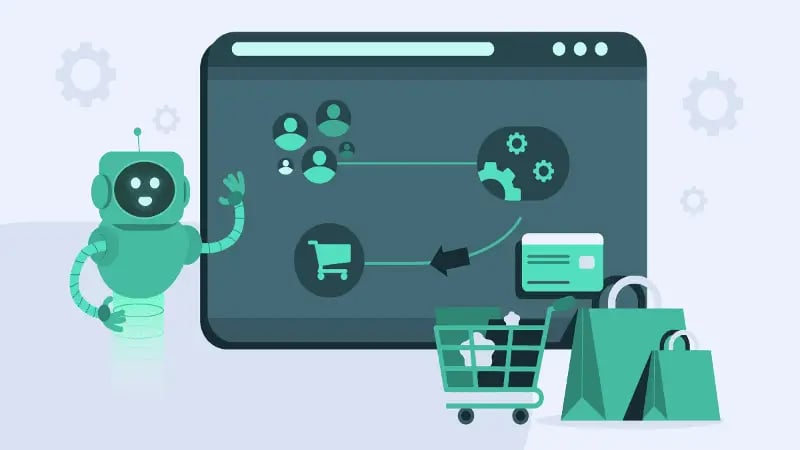What is AI, and Why Does It Matter?
We are diving into the world of AI, exploring what it is, how it works, and why it's rapidly changing our world.
From understanding the difference between machine learning and deep learning to exploring the countless industries AI is transforming, we'll break down this complex topic and reveal why it matters to all of us.

You've probably interacted with artificial intelligence today without even realizing it. Whether it was Netflix suggesting your next binge-worthy series or Amazon recommending products you might like, AI is quietly shaping our experiences. But what exactly is AI, and why is it such a big deal?
-
The global AI market is projected to reach $407 billion by 2027.
-
56% of businesses are using AI to improve and perfect business operations.
-
As many as 97 million people will work in the AI space by 2025.
What is Artificial Intelligence (AI)?
Artificial intelligence, or AI, is the simulation of human intelligence processes by machines, especially computer systems. Essentially, it's about creating technology that can think and learn like humans. However, it's crucial to distinguish between artificial intelligence and general intelligence. While AI can excel at specific tasks, it doesn't possess the same level of understanding and adaptability as a human.
The concept of AI isn't new. Pioneers like Alan Turing laid the groundwork decades ago with his groundbreaking work on computing and intelligence. But it's only in recent years, with advancements in computing power and data availability, that AI has truly taken off.
To truly grasp the impact of AI, we need to delve into some core concepts. Let's start by differentiating between two key terms: machine learning and deep learning.
Machine Learning vs. Deep Learning
Machine learning (ML) is a subset of AI that allows computers to learn and improve from experience without being explicitly programmed. Think of it as teaching a computer to recognize patterns. For instance, spam filters use ML to identify and block unwanted emails. Similarly, product recommendation systems analyze your past purchases to suggest items you might like.
Deep learning (DL) is a more advanced form of ML inspired by the structure and function of the human brain. It involves artificial neural networks that can process vast amounts of data to identify complex patterns. This technology powers facial recognition systems and is at the heart of self-driving car technology.
Types of AI
As AI continues to evolve, it's helpful to categorize it into different types:
-
Artificial Narrow Intelligence (ANI): This is the type of AI we see most commonly today. ANI excels at performing specific tasks but lacks a broader understanding. Examples include virtual assistants, AI chatbots, image recognition software, and chess-playing computers.
-
Artificial General Intelligence (AGI): AGI is still hypothetical but refers to AI with human-level intelligence. This would mean machines capable of understanding, learning, and applying knowledge across various domains, much like humans.
-
Artificial Super Intelligence (ASI): This is a theoretical concept where AI surpasses human intelligence in every aspect. While it raises exciting possibilities, it also brings significant ethical concerns.
How Does AI Work?
At its core, AI relies on two key components: data and algorithms.
-
Data: Think of data as the fuel for AI. The more data an AI system has access to, the better it can learn and make accurate predictions. The quality of data is also crucial. Clean, relevant data is essential for building effective AI models.
-
Algorithms: Algorithms are the set of rules or instructions that AI systems follow to process data and make decisions. They are the "brains" behind AI. Different types of algorithms are used for various tasks, such as decision trees for making classifications and neural networks for complex pattern recognition.
Understanding these fundamental concepts provides a solid foundation for exploring the vast and exciting world of AI. In the next section, we'll dive into the real-world applications of AI and its transformative impact on various industries.
The Impact of AI: Transforming Our World
AI is no longer a concept confined to science fiction. It's a reality that's reshaping industries and our daily lives. Let's explore some of the most significant applications and their impact.
AI in Action: Real-World Applications Across Industries
AI is being deployed across a vast array of sectors, revolutionizing how businesses operate and how we live.
-
Marketing: AI in marketing is causing a transformation through hyper-personalized campaigns, predictive analytics, and customer journey optimization. AI-powered chatbots provide instant customer support, while predictive analytics help identify high-value customers and optimize marketing spend.
-
Healthcare: AI is transforming healthcare by improving diagnosis accuracy, accelerating drug discovery, and enabling personalized treatment plans. For instance, AI-powered image analysis can detect diseases like cancer with unprecedented precision.
-
Finance: From fraud detection to personalized financial advice, AI is enhancing efficiency and security in the financial industry. AI algorithms can analyze vast datasets to identify suspicious transactions, preventing billions of dollars in losses.
-
Manufacturing: AI-driven automation is optimizing production processes, reducing costs, and improving product quality. Predictive maintenance, powered by AI, can predict equipment failures before they occur, minimizing downtime.
-
Retail: AI is personalizing shopping experiences through recommendation systems and targeted advertising. Retailers are leveraging AI to optimize inventory management and improve customer service.
-
Transportation: Self-driving cars are just the tip of the iceberg. AI is also optimizing traffic flow, reducing congestion, and improving public transportation systems.
Benefits of AI
The potential benefits of AI are immense:
-
Increased efficiency and productivity: AI automation can streamline tasks, allowing humans to focus on more complex and creative endeavors.
-
Improved decision-making: AI can analyze vast amounts of data to provide insights and inform better decision-making.
-
Automation of repetitive tasks: By automating mundane tasks, AI frees up human resources for higher-value work.
-
Personalized experiences: AI enables tailored experiences, from product recommendations to healthcare treatments.
-
Solving complex problems: AI has the potential to tackle global challenges, such as climate change and disease.
Challenges and Concerns of AI
While AI offers immense promise, it also presents challenges:
-
Job displacement: Automation driven by AI could lead to job losses in certain sectors.
-
Bias in AI algorithms: AI systems can perpetuate existing biases if trained on biased data.
-
Ethical considerations and safety issues: The development and deployment of AI raise ethical questions, such as privacy, accountability, and the potential for misuse.
Addressing these challenges requires a multifaceted approach. Efforts are underway to develop ethical guidelines for AI, invest in education and retraining programs for displaced workers, and create AI systems that are transparent and accountable. Additionally, researchers are working to mitigate bias in AI algorithms through careful data curation and algorithm design.
As AI continues to evolve, it's essential to balance its potential benefits with the need to address its challenges responsibly.
The Future of AI: What to Expect
The trajectory of AI is incredibly exciting. As technology continues to advance, it promises to reshape our world in profound ways.
The Rise of Collaborative Intelligence
The future of AI is likely to be one of collaboration rather than competition with humans. The concept of "collaborative intelligence" emphasizes the synergy between human creativity and AI's computational power. Imagine doctors using AI tools to analyze medical images and develop treatment plans or scientists collaborating with AI to accelerate drug discovery. This partnership will drive innovation and problem-solving to unprecedented heights.
Continuous Learning and Development
AI is far from reaching its peak. We can expect rapid advancements in AI capabilities as research and development continue. AI models will become increasingly sophisticated, able to learn and adapt more quickly. This continuous evolution will lead to breakthroughs in fields like natural language processing, computer vision, and robotics.
Potential for AI to Solve Global Challenges
AI has the potential to be a powerful tool in addressing some of the world's most pressing challenges. For instance, AI-powered climate models can help predict weather patterns and develop mitigation strategies. In healthcare, AI can accelerate drug discovery and improve disease diagnosis. Additionally, AI can optimize resource allocation and distribution, helping to alleviate poverty and hunger.
Ethical Considerations and Regulations
As AI becomes more integrated into our lives, it's crucial to address ethical concerns and establish robust regulations. Developing AI systems that are fair, unbiased, and transparent is essential to building public trust. Governments and organizations must work together to create ethical frameworks that guide AI development and deployment.
The future of AI holds immense promise, but it also comes with responsibilities. By fostering collaboration, prioritizing ethical development, and focusing on solving global challenges, we can harness the power of AI for the benefit of humanity.
The AI Revolution is Here to Stay
Artificial intelligence is no longer a futuristic concept; it's a driving force reshaping industries and our daily lives. From the way we shop and consume media to how we diagnose diseases and manufacture products, AI is leaving its mark. Its ability to process vast amounts of data, learn from patterns, and make predictions is transforming how businesses operate and how we interact with the world.
The future of AI holds immense promise. As technology continues to advance, we can anticipate a world where humans and AI collaborate seamlessly, driving innovation and solving complex problems. While challenges like bias and job displacement require careful consideration, the potential benefits of AI are undeniable.
Are you ready to harness the power of AI for your business? Understanding AI is the first step. By staying informed about the latest trends and developments, you can position your business for success. Aspiration Marketing can be your partner in this journey. We specialize in helping businesses leverage AI to drive growth and achieve their goals.
This content is also available in:
- German: Was ist KI, und warum ist sie wichtig?
- Spanish: ¿Qué es la IA y por qué es importante?
- French: Qu'est-ce que l'IA et quelle est son importance ?
- Italian: Cos'è l'IA e perché è importante?
- Romanian: Ce este inteligența artificială și de ce este importantă?
- Chinese: 什么是人工智能,为什么它很重要?

Joachim is a certified HubSpot trainer with over 13 years of experience in content marketing, strategy, website development, and SEO. He has implemented numerous large-scale, international growth marketing programs, including one with UiPath, which grew from a startup to a successful IPO on the NYSE. Joachim has special expertise in multilingual marketing and sales enablement projects, and he uses the latest AI technologies to help our clients.








Leave a Comment